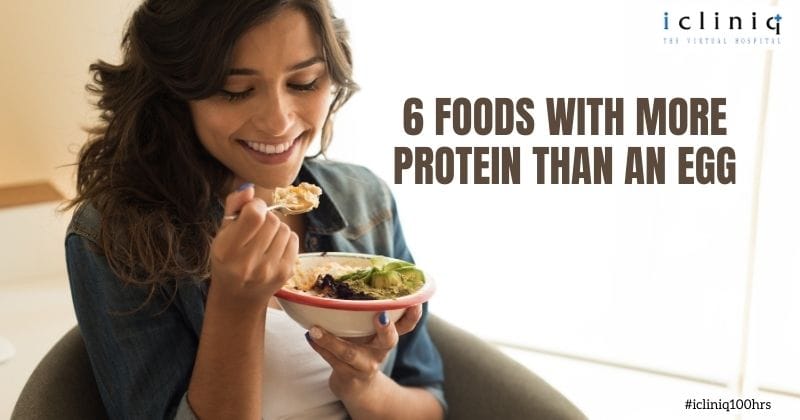6 Foods With More Protein Than an Egg

With around 6 grams of protein, 13 essential minerals and vitamins, and brain-healthy nutrients present in a single egg, it is a superfood in itself. As eggs are loaded with nutrients, tasty, and very easy to prepare, they are perfect for our modern diet. But what if you are a vegan or vegetarian or are allergic to eggs. There is a myth associated with protein deficiency and vegetarians. Most of us associate proteins with egg and meat, but a surprising number of plant-based foods contain equal or more protein than an egg.

Protein is vital for building muscle mass, boosting the immune system, satisfying hunger, and recovering from an injury. So, if you are looking to include more protein in your diet and cut down on your egg and meat consumption, you can have the following foods that are packed with more protein per serving than a large egg.
1. Chickpea

This small, round legume, also called garbanzo beans, is extremely nutritious and rich in protein, iron, calcium, minerals, vitamins, zinc, and fiber. Half a cup of chickpeas contains around 8 g of protein. If you are cutting down on meat consumption, a serving of chickpeas and rice or hummus or chickpeas salad can contribute a significant amount of protein to the diet. You can get almost one-third of your daily protein needs by consuming a cup of chickpeas.
2. Tofu

Tofu, otherwise called bean curd, is made from soy milk. With just one serving of tofu containing 14 g of protein, it is an excellent source. As it does not have a prominent or strong taste, it can be added to smoothies, soups, stir-fries, etc. It also contains nine essential amino acids (making it a complete protein), iron, calcium, manganese, vitamin B1, zinc, copper, and phosphorus. It can also be used as a substitute for meat in curries and gravies.
3. Quinoa

Quinoa, an edible seed, is cooked and consumed as a grain. It is an excellent source of protein and contains more and better protein than most grains. This seed contains 8 g of protein per cup. Quinoa also promotes weight loss and has various other health benefits. It is also a complete plant-based protein, as it contains all the essential amino acids. It is also rich in fiber, which aids gut health. As it tastes bland on its own, add it to salads.
4. Almonds

This nut, which is rich in vitamin E, magnesium, and copper, is also a great protein source. Consuming a quarter cup of almonds provides 7 g of protein. Almonds are high in fat, but this fat is heart-healthy and good for you. Add sliced almonds in salads, use almond butter on toasts, or add them to your smoothies.
5. Greek Yogurt

This thick and tasty probiotic yogurt contains more protein than regular yogurt. A cup of Greek yogurt provides almost 23 g of protein. You can eat this healthy yogurt for breakfast with berries, fresh fruits, chia seeds, and flaxseeds. It is also an excellent snack item and can be used to make various dips.
6. Edamame Beans

These are young soybeans that get harvested before they ripen. Edamame beans are packed with protein and all essential amino acids that your body requires. They are also rich in magnesium, which plays a vital role in providing energy to muscles. Half a cup of steamed edamame beans has 9 g of protein. They also contain calcium and iron.






